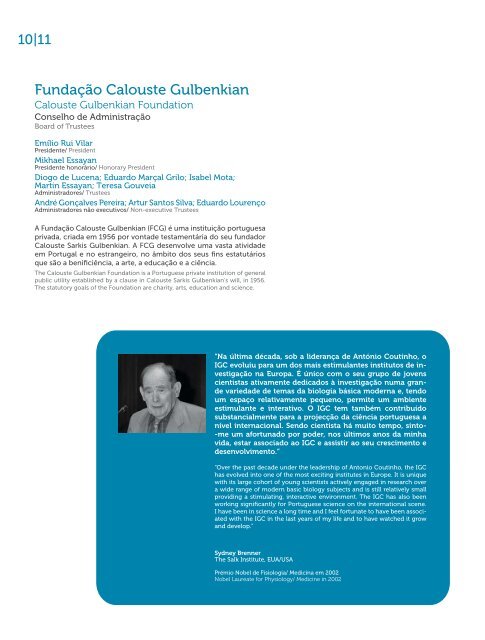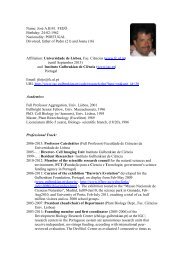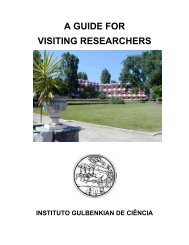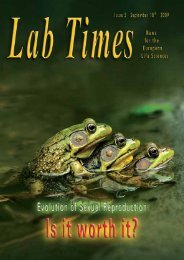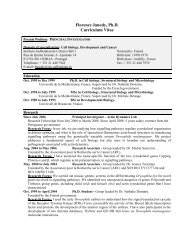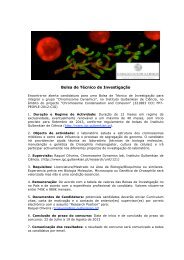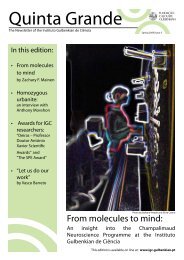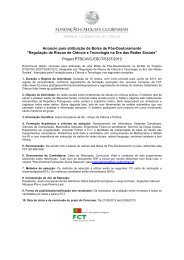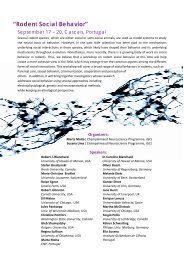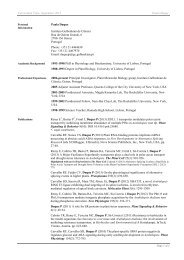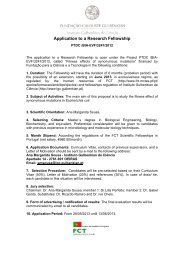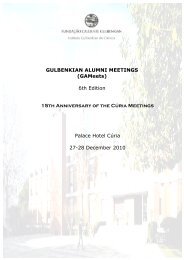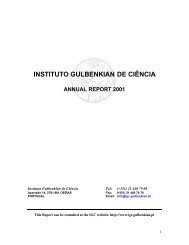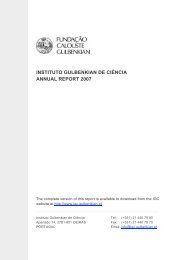Untitled - the Instituto Gulbenkian de Ciência
Untitled - the Instituto Gulbenkian de Ciência
Untitled - the Instituto Gulbenkian de Ciência
You also want an ePaper? Increase the reach of your titles
YUMPU automatically turns print PDFs into web optimized ePapers that Google loves.
10|11<br />
Fundação Calouste <strong>Gulbenkian</strong><br />
Calouste <strong>Gulbenkian</strong> Foundation<br />
Conselho <strong>de</strong> Administração<br />
Board of Trustees<br />
Emílio Rui Vilar<br />
Presi<strong>de</strong>nte/ Presi<strong>de</strong>nt<br />
Mikhael Essayan<br />
Presi<strong>de</strong>nte honorário/ Honorary Presi<strong>de</strong>nt<br />
Diogo <strong>de</strong> Lucena; Eduardo Marçal Grilo; Isabel Mota;<br />
Martin Essayan; Teresa Gouveia<br />
Administradores/ Trustees<br />
André Gonçalves Pereira; Artur Santos Silva; Eduardo Lourenço<br />
Administradores não executivos/ Non-executive Trustees<br />
A Fundação Calouste <strong>Gulbenkian</strong> (FCG) é uma instituição portuguesa<br />
privada, criada em 1956 por vonta<strong>de</strong> testamentária do seu fundador<br />
Calouste Sarkis <strong>Gulbenkian</strong>. A FCG <strong>de</strong>senvolve uma vasta ativida<strong>de</strong><br />
em Portugal e no estrangeiro, no âmbito dos seus fins estatutários<br />
que são a benificiência, a arte, a educação e a ciência.<br />
The Calouste <strong>Gulbenkian</strong> Foundation is a Portuguese private institution of general<br />
public utility established by a clause in Calouste Sarkis <strong>Gulbenkian</strong>’s will, in 1956.<br />
The statutory goals of <strong>the</strong> Foundation are charity, arts, education and science.<br />
<strong>Instituto</strong> <strong>Gulbenkian</strong> <strong>de</strong> Ciência<br />
<strong>Instituto</strong> <strong>Gulbenkian</strong> <strong>de</strong> Ciência<br />
António Coutinho<br />
Diretor/ Director<br />
José Mário Leite<br />
Diretor Adjunto/ Deputy Director<br />
Jocelyne Demengeot<br />
Adjunta do Diretor para os Assuntos Científicos/<br />
Deputy to <strong>the</strong> Director for scientific affairs<br />
Conselho Científico<br />
Scientific Advisory Board<br />
O Conselho Científico internacional do IGC orienta o progresso<br />
científico, os programas <strong>de</strong> ensino pós-graduado e o recrutamento<br />
e <strong>de</strong>sempenho dos grupos <strong>de</strong> investigação. Aconselha também a<br />
Administração da Fundação Calouste <strong>Gulbenkian</strong> em aspetos relevantes<br />
para a missão do IGC.<br />
The IGC International Scientific Advisory Board oversees <strong>the</strong> scientific progress,<br />
graduate programmes, recruitment and overall performance of staff and research<br />
groups. The Scientific Advisory Board also advises <strong>the</strong> Board of <strong>the</strong> Calouste <strong>Gulbenkian</strong><br />
Foundation on all matters of relevance to <strong>the</strong> mission of <strong>the</strong> institute.<br />
11|<br />
Sydney Brenner<br />
The Salk Institute, EUA/ USA<br />
Presi<strong>de</strong>nte/ Chairman<br />
Richard Axel<br />
Columbia University, EUA/ USA<br />
Jean-Pierre Changeux<br />
Pasteur Institute, França/ France<br />
Jonathan Howard<br />
University of Cologne,<br />
Alemanha/ Germany<br />
Nicole Le Douarin<br />
Aca<strong>de</strong>mie <strong>de</strong>s Sciences,<br />
França/ France<br />
Ginés Morata<br />
Universidad Autónoma <strong>de</strong> Madrid,<br />
Espanha/ Spain<br />
Martin Raff<br />
University College London, RU/ UK<br />
David Sabatini<br />
New York University, EUA/ USA<br />
Terrence Sejnowsky<br />
The Salk Institute, EUA/ USA<br />
Kai Simons<br />
Max Planck Institute for Molecular Cell Biology and Genetics,<br />
Dres<strong>de</strong>n, Alemanha/ Germany<br />
Susumu Tonegawa<br />
Massachusetts Institute of Technology, EUA/ USA<br />
“Na última década, sob a li<strong>de</strong>rança <strong>de</strong> António Coutinho, o<br />
IGC evoluiu para um dos mais estimulantes institutos <strong>de</strong> investigação<br />
na Europa. É único com o seu grupo <strong>de</strong> jovens<br />
cientistas ativamente <strong>de</strong>dicados à investigação numa gran<strong>de</strong><br />
varieda<strong>de</strong> <strong>de</strong> temas da biologia básica mo<strong>de</strong>rna e, tendo<br />
um espaço relativamente pequeno, permite um ambiente<br />
estimulante e interativo. O IGC tem também contribuído<br />
substancialmente para a projecção da ciência portuguesa a<br />
nível internacional. Sendo cientista há muito tempo, sinto-<br />
-me um afortunado por po<strong>de</strong>r, nos últimos anos da minha<br />
vida, estar associado ao IGC e assistir ao seu crescimento e<br />
<strong>de</strong>senvolvimento.”<br />
“Over <strong>the</strong> past <strong>de</strong>ca<strong>de</strong> un<strong>de</strong>r <strong>the</strong> lea<strong>de</strong>rship of Antonio Coutinho, <strong>the</strong> IGC<br />
has evolved into one of <strong>the</strong> most exciting institutes in Europe. It is unique<br />
with its large cohort of young scientists actively engaged in research over<br />
a wi<strong>de</strong> range of mo<strong>de</strong>rn basic biology subjects and is still relatively small<br />
providing a stimulating, interactive environment. The IGC has also been<br />
working significantly for Portuguese science on <strong>the</strong> international scene.<br />
I have been in science a long time and I feel fortunate to have been associated<br />
with <strong>the</strong> IGC in <strong>the</strong> last years of my life and to have watched it grow<br />
and <strong>de</strong>velop.”<br />
Sydney Brenner<br />
The Salk Institute, EUA/USA<br />
Prémio Nobel <strong>de</strong> Fisiologia/ Medicina em 2002<br />
Nobel Laureate for Physiology/ Medicine in 2002<br />
“O IGC é um instituto excecional, não só<br />
pela alta qualida<strong>de</strong> da sua investigação mas<br />
também pela extraordinária diversida<strong>de</strong> da<br />
ciência que aí se realiza. Não conheço outro<br />
instituto com as mesmas dimensões, que<br />
chegue próximo <strong>de</strong>sta diversida<strong>de</strong>. O IGC<br />
foi, e continua a ser, um marco <strong>de</strong> investigação<br />
biomédica portuguesa, tanto em Portugal<br />
como no resto do mundo. Pertenço<br />
ao Conselho Científico do IGC <strong>de</strong>s<strong>de</strong> a sua<br />
formação e tem sido um privilégio observar<br />
o instituto crescer e dar frutos, sobre a li<strong>de</strong>rança<br />
inspiradora <strong>de</strong> António Coutinho.”<br />
“The IGC is a truly remarkable institute, not only for<br />
<strong>the</strong> high quality of its research, but also for <strong>the</strong> amazing<br />
diversity of <strong>the</strong> science that is done <strong>the</strong>re. I don’t<br />
know of any o<strong>the</strong>r institute of comparable size that<br />
comes close to matching this diversity. The IGC has<br />
been, and continues to be a a beacon of Portuguese<br />
biomedical science, in Portugal and abroad. I belong<br />
to <strong>the</strong> IGC Scientific Advisory Board since it was<br />
formed, and it has been a privilege to watch <strong>the</strong> institute<br />
grow and flourish un<strong>de</strong>r António Coutinho’s<br />
inspirational lea<strong>de</strong>rship.”<br />
Martin Raff<br />
University College London, RU/ UK


